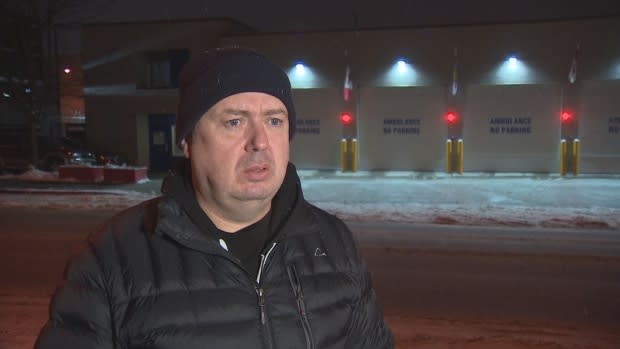6-hour commutes for paramedics who work in Metro Vancouver, but can't afford to live there
At the end of his 12-hour shift as a paramedic Mark Crighton goes "home" to a spare bedroom at a relative's house in Richmond, B.C.
Crighton, 46, works in Vancouver, but lives in Parksville, B.C., and can travel up to six hours each way depending on traffic and ferry conditions.
He makes the journey at the start and end of his four-day rotations because, he says, it's too expensive to live in the Lower Mainland.
"I would love to go home and to see my wife, but it's the price I pay to do the job," said Crighton on a snowy night outside Vancouver's Downtown Eastside ambulance station.
Crighton is one of nearly 200 B.C. paramedics who work full time in Metro Vancouver, but live as far away as Vancouver Island or the Okanagan so they can make ends meet.
The first responders and their union say Metro Vancouver's affordability crisis is forcing people to make choices they never would have made in the past.

Can't afford Vancouver
Chandra Koonts, 40, also lives on Vancouver Island, in Courtenay, B.C. and works as a paramedic in Vancouver.
Her husband is a mechanic and the couple has 16-year-old twin daughters and a 13-year-old son.
Vancouver housing costs for a family of five, she says, are excessive.
Koonts recently priced suitable Metro Vancouver rentals at $2,500 a month.
"We wouldn't be able to get ahead. We wouldn't ever be able to save for anything," said Koonts whose daughters are headed to college in two years.
In Kelowna, B.C., Melanie Stephens and her husband are both paramedics and have lived in the Okanagan while working on the South Coast.
They also have three children.
"With our salaries, we found housing options were pretty unaffordable for us," said Stephens, 44, who has been a paramedic for six years.

According to the paramedics' union, a full-time primary care paramedic with three years of experience earns $74,000 a year.
The Ambulance Paramedics of B.C. (APBC) says after 25 years that wage increases to $77,000.
Crighton, Koonts and Stephens all worked part time in their home communities before applying for coveted full-time jobs which, for the most part, are available only in Metro Vancouver because of higher call volume.
Few full-time options
B.C. Emergency Health Services (BCEHS) hires approximately 300 paramedic recruits annually who work part time as they gain seniority and are able to compete for full-time jobs.
According to BCEHS, based on the way the seniority system works, it typically takes four to five years to gain a full-time job and well into a career before a spot opens up in a smaller city.
"I know paramedics in the Okanagan that commuted for 10 years before they were able to get back to where they lived," said Stephens who now works in Kamloops, B.C.
Her husband recently got a full-time job in Kelowna.
Crighton and Koonts expect to be waiting years for a job on Vancouver Island.
BCEHS, however, says the latest collective agreement with paramedics will create more full-time jobs and there should be shorter waits for paramedics to work close to home.
Tough commutes
Paramedics work four days on and four days off.
Most of those who commute make the trip down the day before their rotation starts and head home as quickly as possible after it ends.
Stephens says at one point she and her husband were both commuting the often treacherous Coquihalla Highway at the same time and hired a nanny to look after their children.
"We would drive the night before our first day shift. And, then after our last nightshift we would drive home," said Stephens.
It meant they were away from their children five nights out of eight.
For Koonts, going back and forth from Vancouver Island each day would incur the expense of a ferry trip and that's too much.
Koonts now travels to Vancouver for her four-day rotation, stays in town during her days off and works some overtime shifts, and then works her next four-day rotation.
She doesn't see her family for 12 days at a time.
"If I could afford to live over there, I absolutely would," she said of Vancouver.
Hacienda living
Instead Koonts pays $625 a month to rent a bedroom in a house in Tsawwassen, south of Vancouver, to use while she's at work.
It's not uncommon for groups of commuting paramedics to rent an apartment and share it between platoons on different shifts.
They refer to the accommodations as haciendas.
"There's always somebody in the hacienda, somebody always staying there and it cuts the cost of rent down significantly," said Crighton.
"Instead of just one person renting it, there's eight people renting it."
APBC president Troy Clifford has watched the affordability crisis evolve over his 32 years as a paramedic.
There used to be a time, he says, paramedics aspired to come to Vancouver.
Now, he says, if they're from outside the region, they're forced to come up with whatever remedies they can to make ends meet.
Crighton and the others agree the additional cost of commuting is still cheaper than moving to live in Vancouver.
"The cost of living here versus the cost of living in Parksville, it's not even comparable," said Crighton.
Treading Water is a series from CBC British Columbia examining the impact of the affordability crisis on people in Metro Vancouver and across the province, including the creative solutions being used to make ends meet.
If you have a story for our Treading Water series, please click here and tell us about it.


